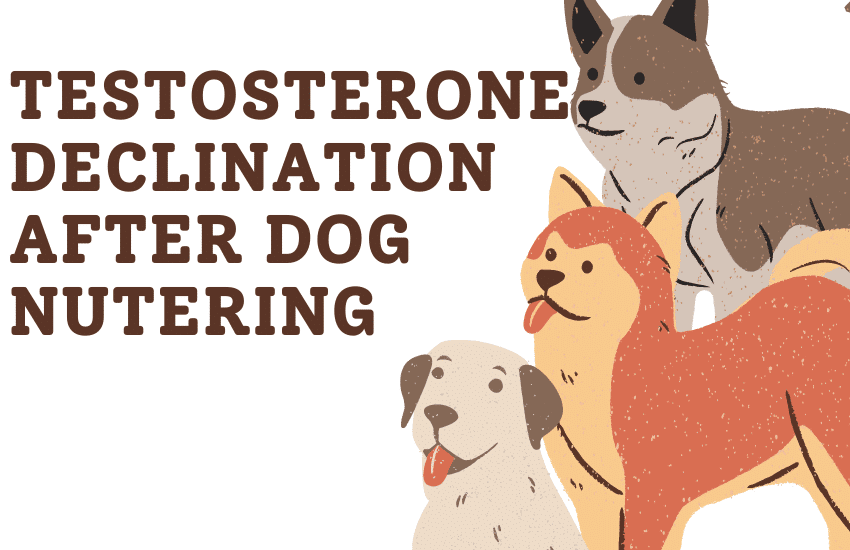Neutering is a common veterinary procedure that involves the removal of a male dog’s testes to prevent reproduction and address certain health issues. One question that often arises among pet owners is “How long after neutering dog is testosterone gone?”. Understanding the timeline for the clearance of testosterone can offer valuable insights into the behavioral and physiological changes that may occur in your furry friend post-surgery.
What Happens to Testosterone Levels After Neutering?
In a neutered dog, the testes, which are responsible for producing testosterone, are surgically removed. As a result, the primary source of testosterone is eliminated, leading to a significant decline in hormone levels in the bloodstream.

Factors Affecting the Clearance of Testosterone
Testosterone is primarily produced by the testes, which are responsible for secreting this hormone. The testes release testosterone into the bloodstream, where it circulates throughout the body and exerts its effects on various physiological processes. Additionally, the adrenal glands also produce a small amount of testosterone in male dogs. This hormone plays a crucial role in sexual development, behavior, and overall health in male dogs.
Several factors can influence how quickly testosterone decreases in a neutered dog, including the dog’s age, breed, size, and overall health. Younger dogs tend to experience a more rapid decline in testosterone levels compared to older dogs.
While neutering will greatly reduce the testosterone levels produced by the testes in male dogs, a small amount of testosterone may still be produced by the adrenal glands. This residual testosterone is typically not enough to cause behavioral or health issues associated with intact male dogs, but it is important to be aware that testosterone levels will not drop to zero after neutering.
How long after neutering dog is testosterone gone?
The timeline for the clearance of testosterone post-neutering can vary from dog to dog. In general, it may take a few weeks to a few months for testosterone levels to diminish significantly. During this period, you may observe changes in your dog’s behavior and physical appearance as their hormone levels adjust.
Example 1: Breed – Golden Retriever
Age: 2 years
Health Condition: Excellent health
Time for Testosterone Decline: Approximately 4-6 weeks post-neutering
Example 2: Breed – Yorkshire Terrier
Age: 5 years
Health Condition: Overweight
Time for Testosterone Decline: Around 2-3 months post-neutering
Example 3: Breed – German Shepherd
Age: 1 year
Health Condition: History of skin allergies
Time for Testosterone Decline: Varies, but typically seen within 6-8 weeks after neutering
Behavioral Changes in Dogs After Neutering
As testosterone levels decline after neutering, pet owners may observe the following behavioral changes in dogs:
Reduced Aggression: Neutered dogs may display less aggression towards other dogs or humans. This can lead to a more sociable and amicable demeanor.
Decreased Roaming: Dogs may exhibit reduced tendencies to roam in search of a mate, as the urge to reproduce diminishes with lower testosterone levels. This can help prevent potential incidents of getting lost or injured while exploring.
Less Marking Behavior: Neutering often leads to a decrease in urine marking, particularly indoors, as the strong urge to scent mark territory is lessened. This can help maintain a cleaner environment within the home.
Lower Sexual and Mounting Behaviors: Dogs may engage less in sexual behaviors such as humping or mounting, as the hormonal drive associated with mating decreases. This can lead to more controlled and appropriate interactions with other dogs.
Improved Focus on Training: With reduced distraction from mating-related behaviors, neutered dogs may exhibit improved focus during training sessions. This can make training more effective and enjoyable for both the dog and the owner.
By recognizing and understanding these potential behavioral changes, pet owners can better support their dogs through the post-neutering period and facilitate a smooth transition to a healthier and more balanced state of being.
What to expect after dog neutering
Just After Neutering:
Physical Recovery: Immediately after neutering, dog owners can expect their pets to experience some soreness, swelling, and lethargy. It’s important to provide a comfortable and quiet space for the dog to rest and recover.
Monitoring: Dog owners should keep a close eye on the incision site for any signs of infection or abnormal swelling. Following the veterinarian’s post-operative care instructions is crucial during this initial period to ensure proper healing.
Short Term (1-3 Months After Neutering):
Hormonal Adjustment: During the short term, dog owners may notice changes in their pet’s behavior as testosterone levels decline. This period may be marked by reduced aggression, roaming, marking behaviors, and in some cases, temporary changes in energy levels.
Weight Management: It’s important to monitor the dog’s food intake and exercise routine during this period to prevent weight gain, as changes in hormone levels can affect metabolism. Adjusting the diet and activity levels as needed can help maintain a healthy weight.
Long Term (6+ Months After Neutering):
Stable Behavior: In the long term, dog owners can expect a more settled and calmer demeanor in their neutered dogs. Behavioral changes observed in the short term are likely to become more consistent as the dog’s body adjusts to lower testosterone levels over time.
Health Benefits: Neutered dogs may experience long-term health benefits, such as a reduced risk of certain reproductive cancers and infections. Regular veterinary check-ups and a balanced diet can help support the dog’s overall health and well-being in the years following neutering.
Benefits of Neutering for Dogs
Beyond the regulation of testosterone levels, neutering offers a range of health benefits for dogs, including a reduced risk of certain cancers, infections, and unwanted behaviors. By neutering your dog, you can contribute to their overall well-being and quality of life.
Possible side effects related to testosterone declination
As a result of testosterone declination after neutering, male dogs may experience various side effects such as temporary weight gain, changes in energy levels, reduced aggression, and decreased territorial marking behavior. Additionally, some dogs may exhibit increased appetite, leading to potential weight management issues if not monitored closely. It’s important for pet owners to be aware of these possible side effects and work closely with their veterinarian to address any concerns and ensure their dog’s well-being during the post-neutering period.
In conclusion, the clearance of testosterone after neutering is a gradual process that can vary depending on individual factors. By understanding how testosterone levels change post-neutering and the potential behavioral effects, pet owners can better support their dogs through this transitional period. Neutering not only helps manage testosterone levels but also offers numerous health benefits that can positively impact the lives of our beloved canine companions.






